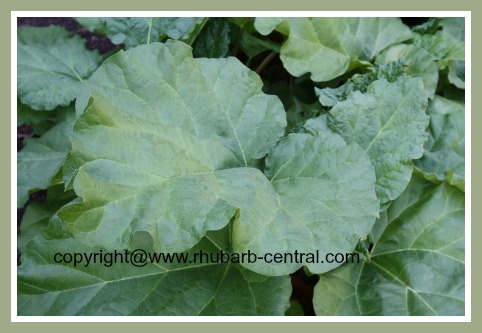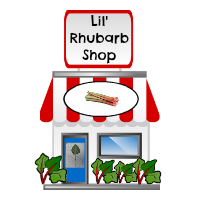Rhubarb Allergy
Can you be Allergic to Rhubarb?
What are the Symptoms or Side Effects?
Although rhubarb is not considered a common source of food allergy and although it is not common to have any side effects from consuming this healthy vegetable, it is possible to be allergic to almost any food, so it is possible to have a rhubarb allergy.
*FTC Disclosure: As an Amazon Associate I may earn from qualifying purchases with no extra cost to you
*FTC Disclosure: As an Amazon Associate I may earn from qualifying
purchases with no extra cost to you
Foods are categorized into botanical food families.
If you are allergic to one member of a food family, you may also be allergic to other members of the same food family.
Rhubarb is part of the "Buckwheat" Family, so if you are allergic to rhubarb you may also be allergic to buckwheat and garden sorrel.
The stalk of the rhubarb plant is used both as a food and for medicinal purposes.
An allergic response to rhubarb may be caused by consuming the rhubarb, handling the rhubarb, or by ingesting rhubarb medicinal supplements.

Before taking rhubarb medicinal supplements it is always advisable to seek the professional guidance from your healthcare provider. Prolonged use of these supplements may cause adverse side effects in some people.
Rhubarb supplements may, in some cases, interfere with your body's ability to absorb medications that you may be taking, or they may be harmful to take while taking other medications.
What are the Symptoms of a Rhubarb Food Allergy?
What may be the symptoms of a rhubarb food allergy?
In simple terms a genuine rhubarb allergy will cause the immune system of the body to over-react because of the proteins in the food.
As a result the body releases histamines which cause the allergic response symptom.
The type of allergic reaction, and the severity of the reaction to food allergies vary between individuals.
Some individuals have a mild response to a food allergy, others may have a very severe response.
The symptoms of an allergic response to rhubarb are similar to an allergic response to other food which may include stomach discomfort, nausea, vomiting, bloating, abdominal cramping or diarrhea in certain people.
Other symptoms may include, skin reactions such as the development of hives, eczema and generally itchy skin.
There may be respiratory symptoms such as shortness of breath, chest pain, wheezing and coughing.
Some allergic reactions to food may cause facial or throat swelling, lightheadedness, and increased heart rate.
These are just some of the possible body reactions to a rhubarb allergy.
If you suspect you have a rhubarb food allergy, or any food allergy be sure to contact your health care provider or contact Emergency Medical Services.
While it may be possible to have an allergic reaction to eating rhubarb, other factors should also be considered, namely rhubarb leaf allergy, rhubarb leaf poisoning and rhubarb food intolerance.
Rhubarb Leaf Allergy
Handling rhubarb plants may result in allergy symptoms of itching of the skin or mucous membranes shortly after contact with the rhubarb plants. This may occur, for example, after harvesting your rhubarb patch. The time frame between contact with the rhubarb plant and the skin reaction depends on the spread of rhubarb allergens throughout the body.

Itching may begin in the mouth, lips, tongue or throat right away, or after a period of time.
Itchy skin and eyes may happen almost immediately upon contact with the plants or when their irritants reach the skin or eye membranes as the allergens spread internally via the bloodstream.
If you are allergic to rhubarb plants, the best practice is to be sure to wear disposable gloves, and long sleeves to protect your skin from coming in contact with the plants.
Also, avoid rubbing your face or eyes with your hands. When you are finished harvesting the rhubarb, dispose of the gloves, change and wash your clothing, and wash your hands. This will help to prevent spreading the plant irritants.
GO to Harvesting Rhubarb Tips
Rhubarb Leaf Poisoning
Rhubarb Leaves are poisonous due to the fact that they contain high levels of Oxalic Acid. Oxalic Acid is sometimes called "ethane diacid".
Symptoms of poisoning from rhubarb plants may be similar to that of allergy symptoms and may include abdominal pain, collapse, convulsions, kidney problems, low blood pressure, mouth pain, shock, throat pain, tremors, vomiting, weak pulse. (Information Source: Medline Plus).
If you suspect you or someone else has ingested rhubarb leaves, call Emergency Medical Services or a Poison Control Center.
GO to Rhubarb Leaves are Poisonous
Rhubarb Food Intolerance
Rh
Rhubarb intolerance is a condition which is easily confused with a rhubarb allergy.
Most food intolerance symptoms affect the digestive system, such as nausea, stomach pain, vomiting and diarrhea to mention a few.
Rhubarb food intolerance is not the same as a rhubarb food allergy because a food intolerance is a malfunction of the digestive system, while a food allergy is an overreaction of the immune system.
TOP of Rhubarb Allergy Information
RETURN to More About the Rhubarb Leaves
HOME to Everything Rhubarb at Rhubarb Central.com
Enjoy this Page? Please Share!
©2010-2025 Rhubarb-Central.com
All Rights Reserved Worldwide
No Reproduction Permitted Without the Expressed
Written Consent of the Site Owner
















